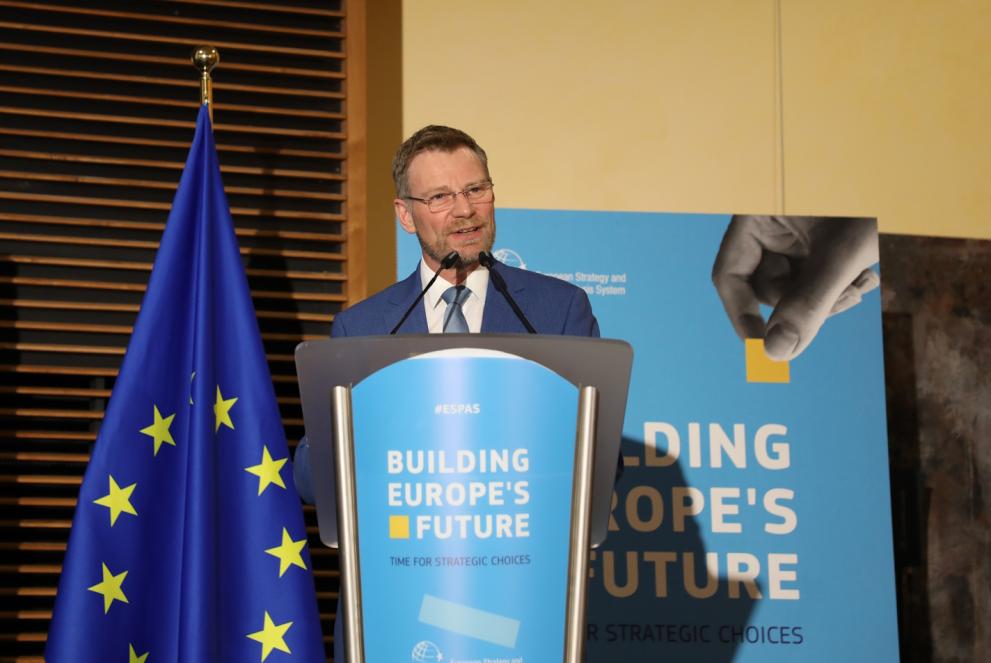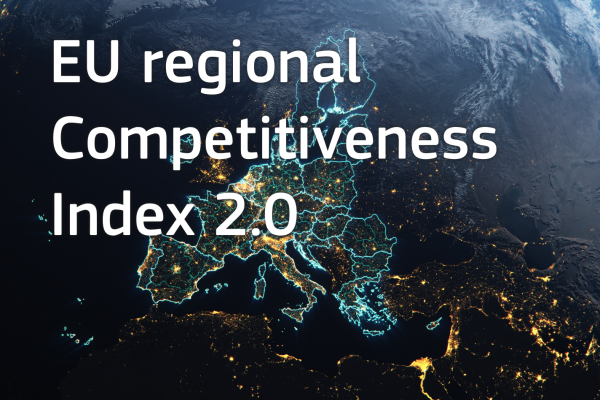
On 14 November, Stephen Quest, Director-General of the EU Commission Joint Research Centre (JRC) and Chair of ESPAS opened the annual foresight conference of the European Strategy and Policy Analysis System (ESPAS). This year, the conference took place in the EU Commission Berlaymont building and was co-organised by the European Commission and the European Parliament by inviting policymakers and experts present to discuss the EU's strategic choices for the next electoral cycle and beyond, up to 2040.
The EU vision: the need for actionable foresight
Foresight is not about predicting the future, but about shaping a desirable future through anticipation, preparation, and strategic redirection. This idea fuelled the high-level opening session, which focused on turning foresight insights into tangible action.
In our union of 27, many EU countries now have dedicated foresight units. Hadja Lahbib, Minister for Foreign Affairs of Belgium, and Anna Lührmann, Minister of State for Europe and Climate in Germany explained the foresight work done in their countries.
An actionable approach to foresight is key, according to Maroš Šefčovič, the European Commission's Executive Vice-President responsible for foresight. He highlighted the integration of a foresight toolbox into every legislative proposal, ensuring they stand the test of time.
Acknowledging ESPAS's role in bolstering foresight capacity, the European Parliament’s Vice-President responsible for foresight and anticipatory governance Marc Angel asserted that Europe's potential to lead hinges on its ability to anticipate and prepare optimally for the future.
What will power look like in 2040? Fragmentation and power shifts
In this discussion, Constanze Stelzenmüller of the Brookings Institution, Mikko Huotari of the Mercator Institute, and Steven Everts from the European Union Institute of Security Studies scrutinised the evolving dynamics between the United States and China and explored how the European Union should position itself in the changing geopolitical landscape.
Globalisation and deglobalisation: the future of economic power
In this panel, Kazumasa Iwata of the Japan Centre for Economic Research, Jean Pisani-Ferry of Bruegel, and Maria Demertzis, also from Bruegel, spoke about the strategic choice of the European Union in a world nearing geo-economic fragmentation and nevertheless requiring international cooperation for fighting climate change.
Tech race: What can the EU offer?
In view of the rapidly changing tech landscape, regulation featured high on the agenda of this session.
First, Anu Bradford of Columbia University explored legislative questions related to regulating AI. In the subsequent panel discussion, Gemma Galdón Clavell of Eticas Tech, Ajit Jaokar of Oxford University, and Nathalie Moll from the European Federation of Pharmaceutical Industries and Associations debated the opportunities and challenges related to AI, machine learning, biotechnologies, and quantum computing for an European Union seeking strategic autonomy.
Cooperation on climate change: cooperation and competition
Thomas Pellerin-Carlin of the EU Climate Investments, Valérie Trouet of the Belgian Climate Centre, and Yamide Dagnet of the Open Society Foundations explored the competition and opportunities linked to the green transition and sustainable practices.
People power: rolling back authoritarianism
Kalypso Nicolaïdis from the European University Institute, Joseph Cyrulik from the National Intelligence Council, and Ricardo Borges de Castro of the European Policy Centre see promising signs of a democratic renaissance by 2040, powered by digital monitoring tools and a shift towards transgenerational democracy, while highlighting democratisation challenges in enlargement candidate countries.
This year’s ESPAS foresight conference provided a vital platform for discussing Europe's strategic choices for the future. Key themes included the need for actionable foresight, changes in global power dynamics, the effects of globalisation and deglobalisation, the race for technological regulation, climate change cooperation, and democratic resurgence. The conference highlighted the EU's proactive role in these areas but also emphasised the urgency for more concerted efforts in regulation, climate action and geopolitical strategy. As Europe navigates its future, anticipatory governance, international cooperation and public engagement play a major role in shaping a desirable future.
The insights generated at the conference will inform the ESPAS Global Trends Report, set for publication in spring 2024.
What is the ESPAS conference?
The annual conference of the European Strategy and Policy Analysis System (ESPAS), an inter-institutional EU process promoting foresight and anticipatory governance, brings together political figures and experts from around the world.
It feeds into the preparation of the ESPAS Global Trends Report, the next edition of which isexpected to be published in spring 2024.
This 11th edition of the ESPAS conference was co-organised by the JRC’s dedicated foresight unit, the EU Policy Lab: Foresight, Design & Behavioural Insights together with the European Parliamentary Research Service and other Parliament services. It was the first hybrid ESPAS conference after several pandemic-related virtual-only editions, being organised in the European Commission’s Berlaymont building.
Details
- Publication date
- 20 November 2023
- Author
- Joint Research Centre
- JRC portfolios




